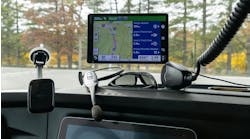Last December, Sec. of Transportation Ray LaHood, proposed banning interstate bus and truck drivers from using handheld cell phones while operating a vehicle. Meanwhile, the number of productivity apps that can be loaded onto cell phones just keeps mushrooming—leaving fleets to seriously wonder how viable an IT platform cell phones will be for trucking business solutions down the road.
That proposed rule would specifically ban drivers from "reaching for, holding or dialing a cell phone" while driving. Vehicle operators who violate the rule could be charged $2,750 and risk losing their CDL for multiple offenses. Motor carriers that allow their drivers to use hand-held cell phones while driving would face a maximum penalty of $11,000.
The concern for limiting talking and texting is not groundless by any means, though. Perhaps the only thing growing faster than apps for mobile communication devices is the number of accidents caused by drivers using them. According to the Dept. of Transportation (DOT), distracted driving killed nearly 6,000 people last year and injured about half a million more.
However, it may not be time to hang up on cell phones in trucks. Thanks to some enterprising new solution providers, it may be possible to take advantage of the benefits of mobile communication devices without risking a fleet’s safety rating in the process.
Boston-based Illume Software, for example, offers an intelligent GPS-enabled mobile application dubbed iZUP (think “eyes up”) that is designed to eliminate cell phone-related distractions. Load the iZUP application onto a handset and it automatically launches when it detects the phone is in a vehicle traveling over 5 mph. While the vehicle is moving, iZUP sends incoming calls to voice mail and holds text messages until the vehicle stops. It also prevents outgoing communication while in motion, yet is designed to allow emergency 911 calls and calls to other authorized numbers to go through.
“Liability is the number-one reason why fleets are investing in solutions like iZUP,” said Daniel Ross, CEO of Illume Software. “Tens of billions of dollars are lost each year due to cell phone usage while driving and the number of lawsuits appears to be growing as do the dollar amounts involved. Fleet owners are also the ones who usually lose [in court.]
“Existing and proposed rules around the problem of distracted driving are also a motivating factor for fleets as is a very real concern for the safety of their employees and others on the highway and a desire to protect company assets,” he continued. “About 85% of our business is for fleet enterprises and they also want some additional functionality, such as tamper-proof software to help prevent the user from disabling or removing the application, so we notify the fleet if that has occurred.
“Fleets also asked for the ability to allow a passenger in the vehicle to use the cell phone, so that capability is password enabled,” Ross added. “Users or fleets are also allowed to set up to three numbers that are exempt from call blocking and drivers can always access 911. In fact, the system will provide a Google Map location and a date and time stamp for a 911 call.”
According to Ross, Illume is already working on additional functions for the future, including the ability for fleets to see reports on how many calls were made and when they were made to help enforce cell phone use policies and to identify drivers who may need extra training or coaching on that. The iZUP system will also be able tell whether a worker is actually driving a vehicle or simply traveling on a bus or train, where cell phone usage is safe.
DOT is launching a research project of its own into cell phone disabling solutions with the University of Michigan and Virginia Tech, Ross noted, and the two universities have chosen Illume and the iZUP solution to help them with their research. “
Illume is also actively working with insurance companies and expects to see them eventually offer premium discounts to fleets that deploy iZUP. “We currently have contracts with four insurance companies to deploy our system in their own fleets and to offer it for sale to their insurance clients,” Ross said. “The discounts they may eventually offer to clients is strictly up to them, but we know do know that some have initiated the necessary discussions with their state insurance commissioners to make that happen.”
Virginia-based ZoomSafer also offers software designed to prevent employee use of mobile phones while driving. Called FleetSafer Mobile, the software works on Blackberry and Windows mobile phones and an Android version is coming soon. It is designed to automatically lock the phone while driving to prevent calls, texts and emails. FleetSafer will also send auto-reply messages to incoming texts and emails. According to the company, it can be triggered by telematics, Bluetooth technology, or GPS and is customizable to a company’s mobile phone usage policies.
A companion cloud-based software service solution, FleetSafer Vision, is intended to integrate vehicular telematics data (trip information, location, speed, etc.) with mobile device usage data (phone calls, text messages, etc.) and other information (email logs, weather, traffic, etc.) to enable fleet operators to measure and remediate risky behavior and reinforce good behavior. It does not require any software on the phones themselves.
Although the company is relatively new founded in early 2009 by three partners, company CEO Matt Howard, COO Mike Costello and chief product officer, Mike Riemer), it has already formed a number of partnerships, most recently with Xata Turnpike. Among its other partners are Networkfleet, Sprint Nextel, inthinc and GPS Insight.
“Our new partnership with ZoomSafer will enable Xata Turnpike customers to prohibit any use of a mobile device [Windows, Blackberry or soon Android],” said Christian Schenk, vp, product marketing for Xata. “It handles distracted driving in such an efficient way in a centralized location.
“In addition to locking the phone down, it offers fleets the ability to tell if a cell phone was used while the vehicle was in motion, even if there was no accident related to that usage,” he continued. “For instance, they can see that a 17-second call was made at 3:11 p.m. Tuesday and match that to GPS data to see that the call occurred while the vehicle was traveling down the Interstate at 67 miles per hour. With [safety and liability concerns], CSA and distracted driving regulations the risk is just too high for fleets not to track usage.”
There are still more companies offering other technologies to control cell phone usage. Cellcontrol, for instance, makes use of an “always-on cabin module” installed in the vehicle communications port to control use of mobile device functions on multiple units available to the driver and passengers. Special features include the ability to allow calls when a Bluetooth headset is detected.
The availability of various technologies to restrict and track in-vehicle use of mobile devices is likely to continue to expand right along with the growth in the functionality and use of mobile devices themselves.
Think about how the number of active and passive onboard safety systems has grown in an effort to make the business of hauling freight by truck safer and more efficient. Cell phone usage control and tracking systems are the data corollary—tools to make the task of sharing information safer for those moving goods and people down the highway.


